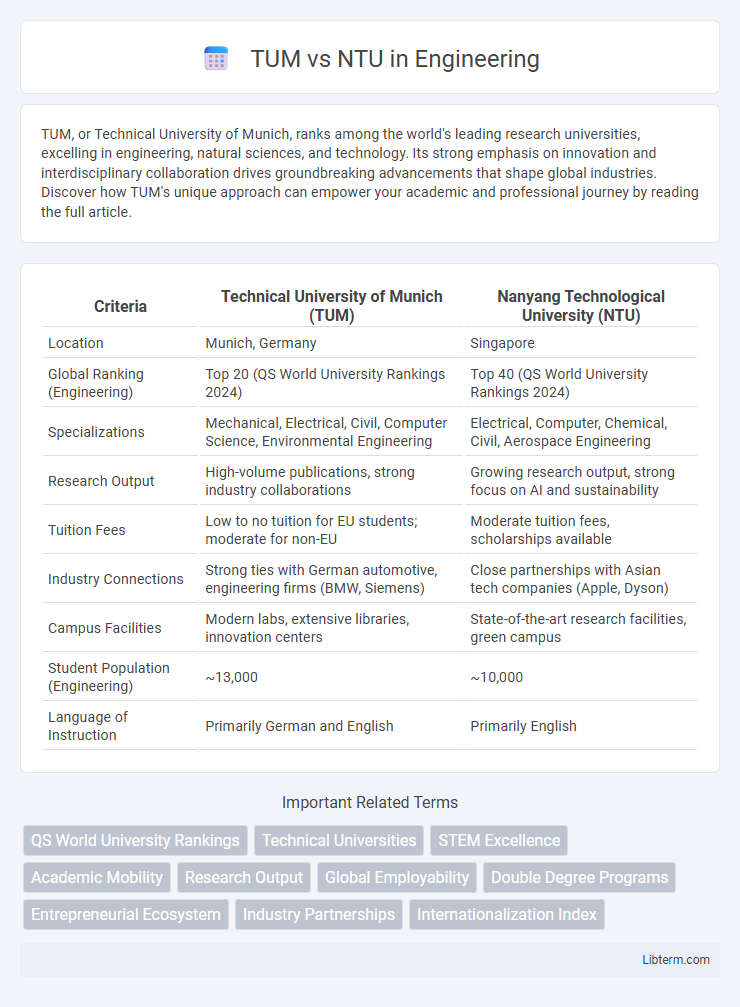TUM, or Technical University of Munich, ranks among the world's leading research universities, excelling in engineering, natural sciences, and technology. Its strong emphasis on innovation and interdisciplinary collaboration drives groundbreaking advancements that shape global industries. Discover how TUM's unique approach can empower your academic and professional journey by reading the full article.
Table of Comparison
| Criteria | Technical University of Munich (TUM) | Nanyang Technological University (NTU) |
|---|---|---|
| Location | Munich, Germany | Singapore |
| Global Ranking (Engineering) | Top 20 (QS World University Rankings 2024) | Top 40 (QS World University Rankings 2024) |
| Specializations | Mechanical, Electrical, Civil, Computer Science, Environmental Engineering | Electrical, Computer, Chemical, Civil, Aerospace Engineering |
| Research Output | High-volume publications, strong industry collaborations | Growing research output, strong focus on AI and sustainability |
| Tuition Fees | Low to no tuition for EU students; moderate for non-EU | Moderate tuition fees, scholarships available |
| Industry Connections | Strong ties with German automotive, engineering firms (BMW, Siemens) | Close partnerships with Asian tech companies (Apple, Dyson) |
| Campus Facilities | Modern labs, extensive libraries, innovation centers | State-of-the-art research facilities, green campus |
| Student Population (Engineering) | ~13,000 | ~10,000 |
| Language of Instruction | Primarily German and English | Primarily English |
Overview of TUM and NTU
Technical University of Munich (TUM) is a leading research institution in Germany renowned for engineering, natural sciences, and technology programs, consistently ranking among Europe's top universities. Nanyang Technological University (NTU) in Singapore excels in innovation and interdisciplinary research with strong emphasis on engineering, business, and hospitality management, recognized globally for its cutting-edge technology research. Both TUM and NTU maintain extensive industry collaborations and state-of-the-art facilities, attracting diverse international students and faculty.
Campus Locations and Facilities
TUM (Technical University of Munich) is primarily located in Munich, Germany, with multiple campuses in areas such as Innenstadt, Garching, and Weihenstephan, offering extensive research labs and advanced engineering facilities. NTU (Nanyang Technological University) in Singapore features a sprawling, modern main campus in the Jurong West district, equipped with cutting-edge research centers, green spaces, and specialized schools for engineering and business. Both universities provide state-of-the-art infrastructure, but TUM's decentralized campus system contrasts with NTU's integrated, urban campus layout.
Academic Excellence and Rankings
Technical University of Munich (TUM) consistently ranks among the top universities globally, recognized for its strong research output and innovation in engineering, natural sciences, and technology fields. Nanyang Technological University (NTU) is also highly ranked, particularly noted for its advancements in engineering, science, and business disciplines, with a growing reputation in Asia and worldwide. Both institutions excel in producing influential research and maintaining strong industry collaborations, contributing significantly to their prestigious academic standings.
Popular Degree Programs Offered
TUM offers popular degree programs in engineering, computer science, and natural sciences, with strong emphasis on innovation and research-driven curricula. NTU is renowned for its business, engineering, and communication studies programs, integrating practical skills with cutting-edge technology. Both universities provide interdisciplinary opportunities, attracting students globally in STEM and management fields.
Research Strengths and Innovations
TUM (Technical University of Munich) excels in engineering, natural sciences, and biotechnology research, driving innovations in renewable energy and medical technology through close industry collaborations. NTU (Nanyang Technological University) leads in artificial intelligence, environmental science, and materials engineering, pioneering sustainable urban solutions and smart city technologies. Both universities rank among the top global institutions with strong interdisciplinary research centers and significant patent outputs.
Admission Requirements and Process
TUM (Technical University of Munich) requires applicants to submit proof of a relevant bachelor's degree, language proficiency in English or German depending on the program, and specific course prerequisites, followed by an online application through the TUMonline portal. NTU (Nanyang Technological University) demands a recognized bachelor's degree, competitive GPA scores, and English proficiency via IELTS or TOEFL, with applications processed through the NTU Online Application System including document uploads and payment of fees. Both universities emphasize academic excellence, relevant coursework, and standardized test scores, with NTU often requiring interviews or additional assessments for certain programs.
Tuition Fees and Scholarships
Technical University of Munich (TUM) offers low tuition fees for international students, typically around EUR144 per semester, supported by the German public university system. Nanyang Technological University (NTU) in Singapore has higher tuition fees, averaging SGD 29,000 to SGD 45,000 per year depending on the program, but provides extensive scholarship opportunities like the ASEAN Graduate Scholarship and NTU Graduate Research Scholarship. Both universities offer merit-based and need-based scholarships to international students that significantly reduce the financial burden, attracting top talent worldwide.
Student Life and Campus Culture
TUM offers a dynamic student life characterized by diverse international communities and extensive research opportunities, fostering innovation and collaboration on campus. NTU emphasizes a vibrant campus culture with strong support for entrepreneurship, sustainability initiatives, and numerous student-led clubs that promote holistic development. Both universities provide state-of-the-art facilities, but TUM's integration with Munich's tech industry contrasts with NTU's focus on interdisciplinary learning within a compact urban campus environment.
Alumni Success and Global Networks
TUM alumni have made significant impacts in fields such as engineering, technology, and business, with many holding leadership positions in global corporations and startups. NTU boasts a vast global network, particularly strong in Asia, facilitating collaborations and career opportunities for its graduates worldwide. Both universities maintain robust alumni associations that actively support professional growth and international connections.
Choosing Between TUM and NTU: Key Considerations
Choosing between TUM (Technical University of Munich) and NTU (Nanyang Technological University) involves evaluating factors such as program specialization, campus culture, and geographic location. TUM excels in engineering and technology with a strong emphasis on research collaboration within Europe, while NTU offers a diverse, innovative environment in Asia with strengths in interdisciplinary studies and high-tech innovation. Consider your career goals, language preferences, and industry connections when deciding between these top-ranked universities.
TUM Infographic

 libterm.com
libterm.com